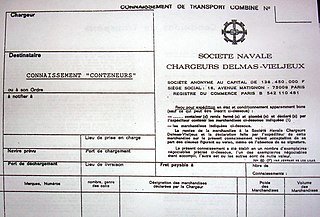Protection and indemnity insurance, more commonly known as P&I insurance, is a form of mutual maritime insurance provided by a P&I club. Whereas a marine insurance company provides "hull and machinery" cover for shipowners, and cargo cover for cargo owners, a P&I club provides cover for open-ended risks that traditional insurers are reluctant to insure. Typical P&I cover includes: a carrier's third-party risks for damage caused to cargo during carriage; war risks; and risks of environmental damage such as oil spills and pollution. In the UK, both traditional underwriters and P&I clubs are subject to the Marine Insurance Act 1906.
Fundamental breach of contract, is a controversial concept within the common law of contract. The doctrine was, in particular, nurtured by Lord Denning, Master of the Rolls from 1962 to 1982, but it did not find favour with the House of Lords.
Chartering is an activity within the shipping industry whereby a shipowner hires out the use of their vessel to a charterer. The contract between the parties is called a charterparty. The three main types of charter are: demise charter, voyage charter, and time charter.
Marine insurance covers the physical loss or damage of ships, cargo, terminals, and any transport by which the property is transferred, acquired, or held between the points of origin and the final destination. Cargo insurance is the sub-branch of marine insurance, though marine insurance also includes onshore and offshore exposed property,, hull, marine casualty, and marine liability. When goods are transported by mail or courier or related post, shipping insurance is used instead.
A charterparty is a maritime contract between a shipowner and a "charterer" for the hire of either a ship for the carriage of passengers or cargo, or a yacht for leisure.
In commercial shipping, laytime is the amount of time allowed in a voyage charter for the loading and unloading of cargo.
The Hague–Visby Rules is a set of international rules for the international carriage of goods by sea. They are a slightly updated version of the original Hague Rules which were drafted in Brussels in 1924.
The Hague Rules of 1924 is an international convention to impose minimum standards upon commercial carriers of goods by sea. Previously, only the common law provided protection to cargo-owners; but the Hague Rules should not be seen as a "consumers' charter" for shippers because the 1924 Convention actually favoured carriers and reduced their obligations to shippers.
Affreightment is a legal term relating to shipping.
Admiralty law in the United States is a matter of federal law.

Hong Kong Fir Shipping Co Ltd v Kawasaki Kisen Kaisha Ltd [1962] 2 QB 26 [1961] EWCA Civ 7 is a landmark English contract law case. It introduced the concept of innominate terms, a category between "warranties" and "conditions".

Maredelanto Compania Naviera SA v Bergbau-Handel GmbH or The Mihalis Angelos [1970] EWCA Civ 4 is an English contract law case, concerning breach of contract.
In English contract law, an innominate term is an intermediate term which cannot be defined as either a "condition" or a "warranty".
Jackson v Union Marine Insurance (1874) 10 Common Pleas 125 is an early English contract law case concerning the right to terminate an agreement.

The "Rotterdam Rules" is a treaty proposing new international rules to revise the legal framework for maritime affreightment and carriage of goods by sea. The Rules primarily address the legal relationship between carriers and cargo-owners.

The doctrine of deviation is a particular aspect of contracts of carriage of goods by sea. A deviation is a departure from the "agreed route" or the "usual route", and it can amount to a serious breach of contract.

A bill of lading is a document issued by a carrier to acknowledge receipt of cargo for shipment. Although the term historically related only to carriage by sea, a bill of lading may today be used for any type of carriage of goods. Bills of lading are one of three crucial documents used in international trade to ensure that exporters receive payment and importers receive the merchandise. The other two documents are a policy of insurance and an invoice. Whereas a bill of lading is negotiable, both a policy and an invoice are assignable. In international trade outside the United States, bills of lading are distinct from waybills in that the latter are not transferable and do not confer title. Nevertheless, the UK Carriage of Goods by Sea Act 1992 grants "all rights of suit under the contract of carriage" to the lawful holder of a bill of lading, or to the consignee under a sea waybill or a ship's delivery order.

The Carriage of Goods by Sea Act 1971 is a United Kingdom Act of Parliament. It incorporates into English Law the Hague-Visby Rules which are to be found as the Schedule to the Act. The Act does not use the term "Hague-Visby Rules" as such; instead, the Rules are referred to in that Act as the "Hague Rules As Amended".
The law of carriage of goods by sea is a body of law that governs the rights and duties of shippers, carriers and consignees of marine cargo.

Leduc v Ward is a leading English case on deviation within the law of carriage of goods by sea. The case also addresses bills of lading, and the parol evidence rule.






